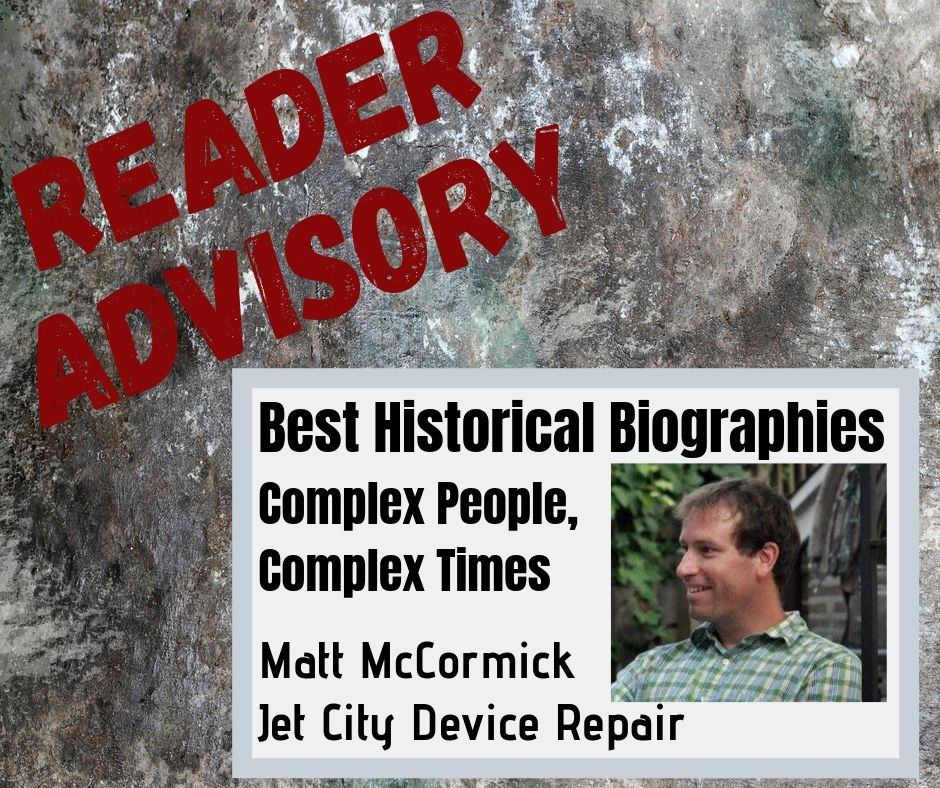Submitted by Matt McCormick, of Jet City Device Repair.

Matt is a small business owner, computer software developer, avid non-fiction reader, husband, and father to two awesome little boys.
Reader Advisory is a series in which community and business leaders and our staff offer their top 5 books on any topic. To contribute, e-mail [email protected].
The Dark Genius of Wall Street by Edward J Renehan Jr.
If you're like most people, you've never heard of Jay Gould. That's too bad. His life and the times he lived in are fascinating. Adjusted for inflation, he was one of the top 10 richest men in American history – and he started from scratch.
He was also a real life version of Lex Luthor.
There is one scene in his life where he is literally running from the New York Police carrying a duffle bag with two million dollars in it (the police were “hired” by Cornelius Vanderbilt to break up Gould's railroad business). He jumps on a small dinghy and paddles out to catch a ferry. He almost dies in the process. Once in New Jersey, he rents a hotel, and begins making covert trips to New York to bribe politicians and law enforcement so he can come back to the city.
He was demonized in his day for good reason. Like most of the robber barons he never seemed to consider all the people hurt by his dealings–and there were a lot of them. But he was more complex than that.
He was a master of finance when it was in its infancy. He wasn't doing anything illegal or that other financiers of the day weren't doing, but he was much smarter and better at it than everyone else. He amassed a massive fortune as a result.
However, he didn't just take. He built real businesses that helped transform American business and society. At least two of those businesses are still around today: Western Union and the Union Pacific Railroad.
This book isn't for everyone. But if you like history and you like biographies, I think you'll really enjoy reading this.
The Match King by Frank Partnoy
If you love history, biographies, and crazy business stories, you'll love this book.
I had never heard of Ivar Kreuger until listening to a podcast on business scandals. While most people have never heard of Ivar Kreuger today, he was incredibly famous and loved in America in the 1920's and early 1930's. Then he became one of the world's most hated men.
In fact, Ivar Kreuger is the man responsible for the US government creating the SEC to monitor publicly traded companies. When his web of financial tricks finally ran out of thread (and he committed suicide), most of his businesses collapsed. One of the most prestigious banks of the time went under (his bankers), and the world had another mini-recession (there's a stock market crash in 1932 referred to as the Kreuger Crash).
Ivar Kreuger, like Jay Gould, is an easy man to despise using today's standards. For many people in his day – and many financial historians today – he was simply a precursor to Kenneth Lay and Enron. But after reading this book, I find the comparison to be superficial and misleading.
Ivar Kreuger built a real and successful match business in his native country of Sweden in the early 1900s. That business is still around today (Swedish Match). He revolutionized the construction field with a company that did large-scale construction projects on time and under budget–and did them extremely well. In fact, they built the Stockholm City Hall,where the Nobel Prize is awarded.
The book also argues that Kreuger's loans to European countries (in exchange for match monopolies) helped save Europe after World War I. France, for example, would have been in huge financial trouble without him.
He also invented several different financial products that are still in use today. (This may not be a great part of his legacy, though).
He was a product of his times. He ran his businesses with very sketchy accounting practices, tended to fudge numbers to get more money, and wasn't honest with the public. But that was true even of most publicly traded company in the 1920s (and a big reason for the 1929 crash).
After he committed suicide and the knowledge of what he had been doing became public, he was instantly demonized.
Even so, his businesses returned significantly more money to their shareholders than most other businesses that went through the 1929 crash. It took until the mid-1940's to unravel the legal mess he caused, but it turned out that he had built real businesses with real profits and customers. This is where he differs significantly from Enron and WorldCom.
The Generals: Patton, MacArthur, Marshall, and the Winning of World War II by Winston Groom
Wow! Just simply, wow!
I had obviously heard of Patton, MacArthur, and Marshall; I had no idea how impressive and complicated each man was. Not to mention the amazing times they lived through – from horses to tanks to aircraft carriers.
These men saw both the most amazing advances in human history and some of its worst atrocities.
This book is not only well written, but it is full of fantastic storytelling.
A World Lit Only by Fire by William Manchester
A great and well written history of the dark ages, the Catholic Church, and Magellan. It's safe to say that this was a horrible time in the history of Europe, but I found it fascinating how much of what we think of as exceptional religious dogma today was a common part of life in those days.
The Presidents Club by Nancy Gibbs and Michael Duffy
It examines the relationships between the presidents, from Truman and his relationship with Hoover all the way through Barack Obama. It also examines the complicated times in which all of them have lived. Truman, for example, gets a bad rep from most historians. Imagine being the first person in history with the power to destroy most of the world (the atomic and then hydrogen bomb). There was no historical precedent for such power or how to wield it.
Or Nixon sabotaging Johnson's peace attempts in Vietnam so that he could get elected president. Think how many young boys died needlessly because of his pursuit of power. And yet, Nixon was arguably one of the most brilliant intellects and tacticians in the history of American politics. So much so that Bill Clinton once said it was like losing a father when Nixon died. “Who will I go to now for the hard decisions?” he asked.
What floors me about this book: The incredible amount of research that had to be done to write it. Imagine writing a comprehensive biography of 12 presidents. This book had to have taken years of concentrated effort and decades of dedication to history.
Epic!
